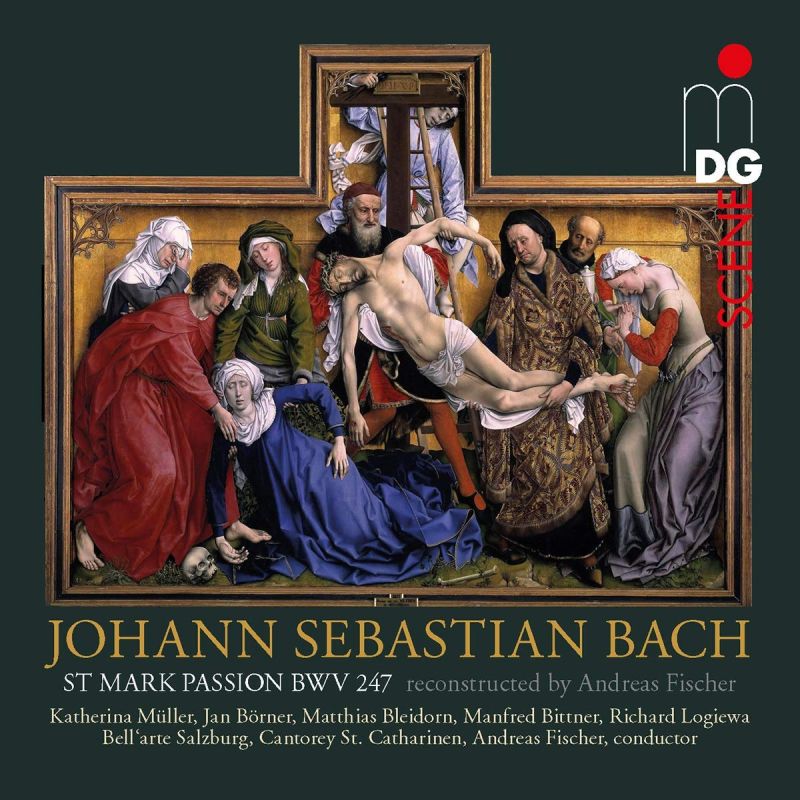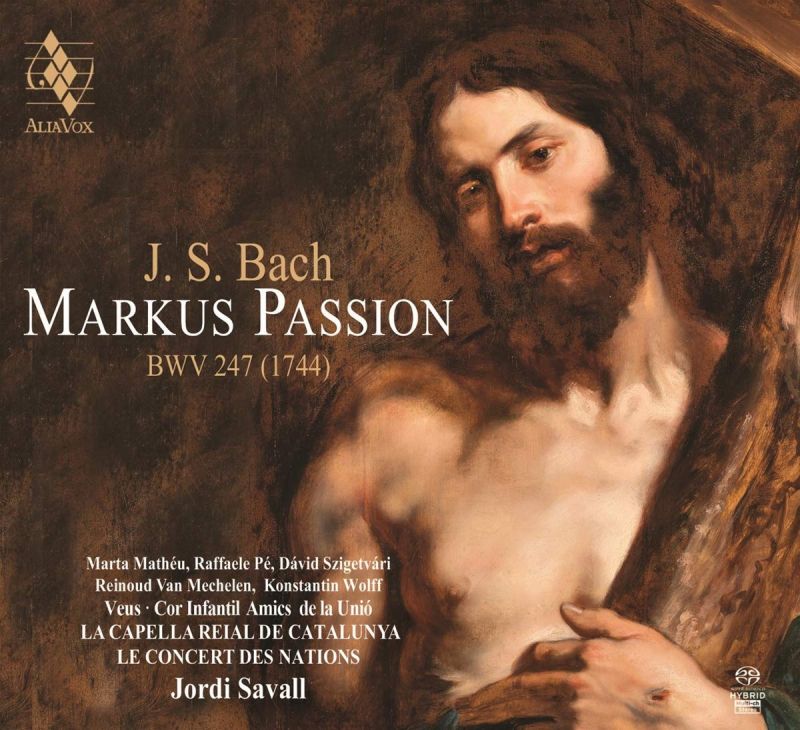JS BACH St Mark Passion (Savall. Fischer)
View record and artist detailsRecord and Artist Details
Composer or Director: Johann Sebastian Bach
Genre:
Vocal
Label: Dabringhaus und Grimm
Magazine Review Date: 06/2019
Media Format: Super Audio CD
Media Runtime: 131
Mastering:
DDD
Catalogue Number: MDG902 2104‑6

Tracks:
| Composition | Artist Credit |
|---|---|
| St Mark Passion |
Johann Sebastian Bach, Composer
Andreas Fischer, Conductor Bell’arte Salzburg Cantorey St Catharinen Jan Börner, Countertenor Johann Sebastian Bach, Composer Katherina Müller, Soprano Manfred Bittner, Bass Matthias Bleidorn, Evangelist, Tenor Richard Logiewa, Christus, Baritone |
Composer or Director: Johann Sebastian Bach, Jordi Savall
Genre:
Vocal
Label: Alia Vox
Magazine Review Date: 06/2019
Media Format: CD or Download
Media Runtime: 110
Mastering:
DDD
Catalogue Number: AVSA9931

Tracks:
| Composition | Artist Credit |
|---|---|
| St Mark Passion |
Johann Sebastian Bach, Composer
(La) Capella Reial de Catalunya (Le) Concert des Nations David Szigetvari, Evangelist, Tenor Johann Sebastian Bach, Composer Jordi Savall, Composer Konstantin Wolff, Bass Marta Mathéu, Soprano Raffaele Pé, Countertenor Reinoud van Mechelen, Tenor |
Author: David Vickers
The choir of 25 (including children on the upper parts) and Le Concert des Nations produce a vivid performance in which emotional directness is paramount. David Szigetvári is a capable Evangelist, although Konstantin Wolff’s gritty Christus is closer to a roaring Wotan than the compassionate redeemer of the world. Raffaele Pé has a few momentary fragilities but his full-bodied ‘Falsche Welt, dein schmeichelnd Küssen’ (adjusted from Cantata No 54) is characterised as a bitterly indignant response to Judas’s kiss, its five-part strings played with cut and thrust. The waspishly driven strings in ‘Ich lasse dich, mein Jesus, nicht’ (from Cantata No 2) force Reinoud Van Mechelen to push uncomfortably; his expressive abilities are better served in ‘Mein Tröster ist nicht mehr bei mir’ (No 198), shaped beautifully by two flautists in pensive dialogue with oboe, viols and pizzicato bass. Marta Mathéu’s crisp dialogue with Manfredo Kraemer’s obbligato violin in ‘Angenehmes Mordgeschrei!’ is delightful – although Savall’s choice of cheerful quick music that Bach used in two guises to celebrate the name day of a university professor (Cantata No 205) or New Year’s Day (No 171) seems like an incongruous response to the mob baying for Christ’s crucifixion. On the other hand, Savall’s idea to follow Christ’s death with a turbulent aria for tenor, jagged basso continuo, plaintive flute and soprano chorale melody altered from the 1725 version of the St John Passion is an aptly anguished response that also anticipates the rending of the temple.
Andreas Fischer, the Kantor of the Catharinenkirche in Hamburg (where the teenage Bach heard Reinken play the organ), also selects suitable parody models for his own reconstruction. The booklet offers no transparency about his decisions, which are often significantly different from Grychtolik/Savall; those seeking scholarly satisfaction are directed to read the preface to his edition published by Ortus (2016). The Cantorey St Catharinen, a well-drilled group of about 30 adult singers, convey solemn catharsis in the opening chorus, interweaving deftly with the instrumentalists of Bell’arte Salzburg. Matthias Bleidorn is a serene Evangelist, although he struggles in his arias. Richard Logiewa’s Christus balances authority and compassion. Katherina Müller’s ardent ‘Er kommt, er ist vorhanden’ benefits from subtly articulate strings. Jan Börner’s gentle ‘Mein Heiland, dich vergess ich nicht’ is sweetly poetic (the concertante violas da gamba played with hushed sensitivity); the polyphonic five-part strings and vocal melody in ‘Falsche Welt’ are judged with mellifluous sympathy. Fischer’s choices of slow pathos for ‘Ich lasse dich, mein Jesus, nicht’ (Manfred Bittner’s bass voice in consoling dialogue with an oboe da caccia, supported by viols) and a solemn contrapuntal tenor aria with a pair of oboes d’amore for ‘Angenehmes Mordgeschrei!’ are persuasive solutions for their contexts. The absence of an English translation of the libretto is another regrettable deficiency but Fischer’s performance speaks eloquently for itself.
Discover the world's largest classical music catalogue with Presto Music.

Gramophone Digital Club
- Digital Edition
- Digital Archive
- Reviews Database
- Full website access
From £8.75 / month
Subscribe
Gramophone Full Club
- Print Edition
- Digital Edition
- Digital Archive
- Reviews Database
- Full website access
From £11.00 / month
Subscribe
If you are a library, university or other organisation that would be interested in an institutional subscription to Gramophone please click here for further information.




